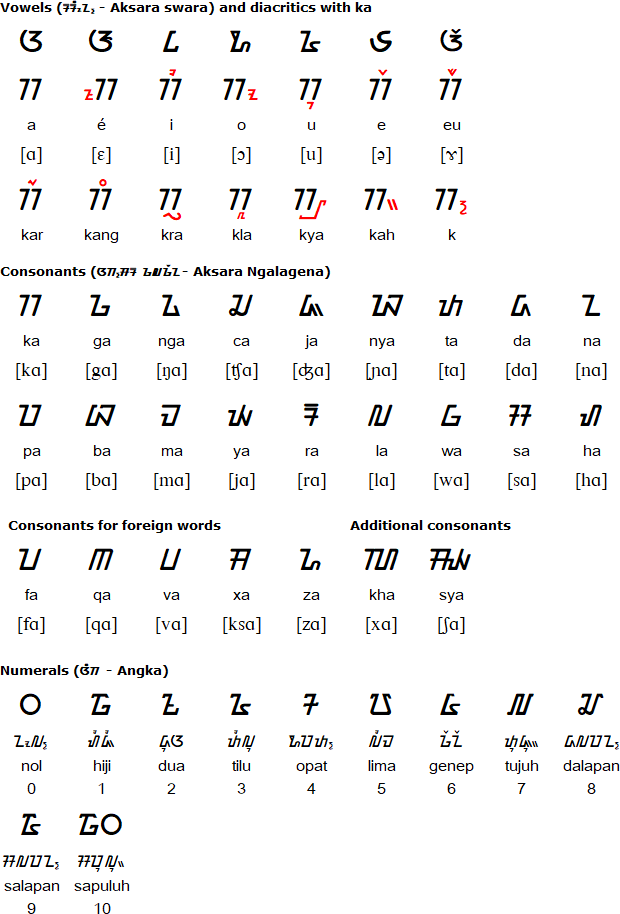The Sundanese script (ᮃᮊ᮪ᮞᮛ ᮞ᮪ᮝᮛ - Aksara Sunda) developed from the Old Sundanese script (Aksara Sunda Kuno), which developed from the Pallava script. It was used between the 14th and 18th centuries, and was standardized during the 1990s. These days Sundanese is normally written with the Latin alphabet, however the Sundanese script is still used to some extent.

Download charts for Sundanese scripts (Excel)

Corrections by Arif Budiarto and Ridwan Maulana
Sakumna jalma gubrag ka alam dunya téh sipatna merdika jeung boga martabat katut hak-hak anu sarua. Maranéhna ibéré akal jeung haté nurani, campur-gaul jeung sasamana aya dina sumanget duduluran.
Listen to a recording of this text by Bryan Chew
All human beings are born free and equal in dignity and rights. They are endowed with reason and conscience and should act towards one another in a spirit of brotherhood.
(Article 1 of the Universal Declaration of Human Rights)
Video by Fim Anugrah. See part 2 and part 3 of this series, or Fim's blog.
Information about Sundanese | Sundanese script | Phrases | Numbers | Tower of Babel
Information about the Sundanese script
http://en.wikipedia.org/wiki/Sundanese_script
https://id.wikipedia.org/wiki/Aksara_Sunda_Baku
https://berita.99.co/aksara-sunda-lengkap-dan-contohnya/
Sundanese script convertors and Sundanese font
http://sabilulungan.org/aksara/
https://www.kompiwin.com/translate-aksara/sunda/
https://fonts.google.com/noto/specimen/Noto+Sans+Sundanese
https://fonts2u.com/sundanese-unicode.font
https://www.kairaga.com/font-sunda/
Ahom, Aima, Arleng, Badagu, Badlit, Basahan, Balinese, Balti-A, Balti-B, Batak, Baybayin, Bengali, Bhaiksuki, Bhujimol, Bilang-bilang, Bima, Blackfoot, Brahmi, Buhid, Burmese, Carrier, Chakma, Cham, Cree, Dehong Dai, Devanagari, Dham Lipi, Dhankari / Sirmauri, Ditema, Dives Akuru, Dogra, Ethiopic, Evēla Akuru, Fox, Fraser, Gond, Goykanadi, Grantha, Gujarati, Gunjala Gondi, Gupta, Gurmukhi, Halbi Lipi, Hanifi, Hanuno'o, Hočąk, Ibalnan, Incung, Inuktitut, Jaunsari Takri, Javanese, Kaithi, Kadamba, Kamarupi, Kannada, Kawi, Kharosthi, Khema, Khe Prih, Khmer, Khojki, Khom Thai, Khudabadi, Kirat Rai, Kōchi, Kodava Lipi, Komering, Kulitan, Kurukh Banna, Lai Tay (Tai Yo), Lampung, Lanna, Lao, Leke, Lepcha, Limbu, Lontara/Makasar, Lota Ende, Magar Akkha, Mahajani, Malayalam, Meitei (Modern), Manpuri (Old), Marchen, Meetei Yelhou Mayek, Meroïtic, Masarm Gondi, Modi, Mon, Mongolian Horizontal Square Script, Multani, Nandinagari, Newa, New Tai Lue, Ojibwe, Odia, Ogan, Pahawh Hmong, Pallava, Phags-pa, Purva Licchavi, Qiang / Rma, Ranjana, Rejang (Kaganga), Sasak, Savara, Satera Jontal, Shan, Sharda, Sheek Bakrii Saphaloo, Siddham, Sinhala, Sorang Sompeng, Sourashtra, Soyombo, Sukhothai, Sundanese, Syloti Nagri, Tagbanwa, Tai Noi, Takri, Tamil, Tanchangya (Ka-Pat), Tani, Thaana, Telugu, Thai, Thirke, Tibetan, Tigalari, Tikamuli, Tocharian, Tolong Siki, Vatteluttu, Warang Citi
Page last modified: 13.04.23
[top]
You can support this site by Buying Me A Coffee, and if you like what you see on this page, you can use the buttons below to share it with people you know.

If you like this site and find it useful, you can support it by making a donation via PayPal or Patreon, or by contributing in other ways. Omniglot is how I make my living.
Note: all links on this site to Amazon.com, Amazon.co.uk
and Amazon.fr
are affiliate links. This means I earn a commission if you click on any of them and buy something. So by clicking on these links you can help to support this site.
[top]